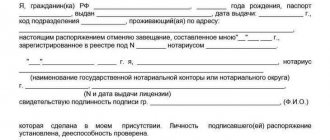Mitrofanova SvetlanaLawyer. Work experience - 15 years
Hello. In short, the procedure for privatizing a municipal apartment in 2021 is as follows: 1) Register the apartment with the cadastral register if it is not included in it; 1) Collect documents; 2) Submit documents to the body that is authorized to accept these documents. After checking the documents, a privatization agreement will be drawn up; 4) Submit documents to the MFC or the Registration Chamber to register ownership of the apartment.
Important! In the article I described only the general procedure and the list of necessary documents. Indeed, in any city or region, the procedure for privatizing apartments and the list of required documents are different, because each has its own official administrative regulations for privatization . For example, in one city you must submit some documents yourself, while in another, privatization employees themselves request them wherever necessary. Despite this, I still pointed out some nuances of different cities. If you have any questions, ask them online to a lawyer in the window at the bottom right of the screen, call the numbers in the site header or in the comments.
A small digression - if you need a free consultation, write online to the lawyer on the right or call (24 hours a day, seven days a week for all regions of the Russian Federation) Moscow and the region; 8 (812) 425-62-89 — St. Petersburg and region; all regions of the Russian Federation.
Stages:
- Stage No. 1 – register the apartment with the cadastral register
- Stage No. 2 – collect documents
- Stage No. 3 – submit documents for drawing up a privatization agreement
- Stage No. 4 – submit an agreement to the MFC or the Registration Chamber to register ownership of the apartment
Who can privatize an apartment
The right is granted to citizens of the Russian Federation who use a residential property under a social tenancy agreement. In this case, all adults entitled to privatize this premises, as well as minors aged 14 to 18 years, must give consent to privatization.
From whom consent is not required, even if he is registered in the residential area:
- Who has already participated in the privatization of another residential property.
- If the resident has issued a refusal of privatization in the prescribed form.
- Children under 14 years of age.
- From someone who was evicted by court order.
If a minor child participated in privatization, he has the right, after reaching adulthood, to become the owner of an apartment one more time under a social tenancy agreement.
✅ Methods for accelerated privatization
If you decide to use accelerated privatization of an apartment, you will need to choose the appropriate method.
There are several options for urgent privatization of housing:
- Payment for urgent preparation of documents
Suitable if you need to collect certificates that are prepared within a month or two, but there is little or no time. By paying for urgency, you will speed up the production of documents. For example, issuing a registration certificate for an apartment will take not 10-30 days, as usual, but 1-2 days. Payment is made at the MFC or BTI - a government agency that is in charge of the technical inventory of real estate.
- Turnkey privatization
Relevant in a situation where a person does not want to deal with the registration personally. Having issued a power of attorney to a representative of the company, the privatization participant will transfer his powers to him. The representative will prepare certificates, draw up an application, contact the administration and register ownership in Rosreestr. The principal will only have to receive the title document and an extract from the Unified State Register of Real Estate.
- Privatization through court
Refusal to privatize in the usual way can be appealed in court. It is advisable to contact a lawyer. But you shouldn’t count on a 30-day registration period. Court hearings can last from 2 to 6 months, so you will still have to wait. But as a result of the proceedings, the person will receive the right to privatize the residential premises (see “Forced privatization of an apartment through the court”).
Expert opinion
Semyon Frolov
Lawyer. 7 years of experience. Specialization: family, inheritance, housing law.
Question: Tell me what to do if my uncle does not want to participate in privatization? We occupy an apartment under a social rental agreement: me, my mother and her brother. My uncle is constantly absent, does not pay utilities, and is often rowdy. We want to take advantage of accelerated privatization, but we cannot get his consent. What should we do?
Lawyer's response:
Your case is one of forced privatization. We recommend not to waste time persuading a troublemaker. File a complaint with the municipality to evict your uncle from the municipal apartment. Report all facts of violations, attach documents, witness statements - all this will form the basis of the statement of claim. The processing time for the application is 10 working days. Then the authorities will decide whether to go to court or not. If the violation of the peace is proven, the court will make a decision to discharge the tenant from the apartment. After which it will be possible to privatize housing in an accelerated manner. We advise you to start collecting documents before the start of court hearings. This way you will save time.
Read what to do if one of the residents does not agree to privatization?
Required documents
The exact list of documents required for filing an application is determined by local authorities.
Standard required:
- Passports for adults and birth certificates for minors of all registered residents.
- Original social tenancy agreement.
- Home Book.
- An extract from a government order or a warrant for an apartment.
- A certificate confirming that the applicant has not used his right to privatization.
- Certificate of family composition.
- Consent/refusal to privatization of adult citizens registered in the apartment. The document must be signed in the presence of an MFC employee or notarized.
- Documents for the apartment: an extract from the Unified State Register of Real Estate, a technical passport, a floor plan, an extract from the personal account about the absence of debt on utility bills.
After collecting documents, an application of the established form is drawn up.
Stage No. 1 – register the apartment with the cadastral register
First, check whether the apartment is registered in the cadastral register: 1) Go to the Rosreestr website using this link. 2) Enter the address of the apartment and click on the “Formulate a request” button. Examples of how to enter apartment addresses:
,
,
,
. Don't forget to enter the body if you have one. 3) If the message “No data was found that satisfies your request” is displayed at the bottom. Try changing the request,” then the apartment most likely is not registered in the cadastral register, because its data is not in the State Property Committee of Rosreestr. If the apartment address and cadastral number are shown, as shown in
, then it is on the cadastral register. You can then immediately move on to stage No. 2.
If the apartment is not registered in the cadastral register, first you need to obtain a technical passport for it. To do this, you need to contact the BTI or the MFC. Have a Russian passport and a warrant or social tenancy agreement with you. The cost of the document is from 900 rubles, you can pay for it at the institution itself. Receipt time is 7-14 days. If the apartment has not undergone a technical inventory, then a technician will come to the apartment. He will measure the apartment, assess its condition and send the data to the BTI. After this, on the appointed day you can pick up the technical passport. If the apartment has undergone a technical inventory, a technician’s visit is not necessary; you can simply pick up the registration certificate on the appointed day.
The technical passport is in hand, now you can register the apartment with the cadastral register. To do this, contact the MFC or the Cadastral Chamber. The process of cadastral registration in these institutions is the same. Bring with you a Russian passport, a warrant or social tenancy agreement, and a technical passport. The employee will fill out an application that must be signed. On the appointed day, an employee of the Cadastral Chamber must arrive at the apartment. He will measure the apartment to enter this information into the State Property Committee. After this, on the appointed day, you should come to the institution and pick up an extract from the Unified State Register of Real Estate about the property. This extract will show the cadastral number of the apartment and other information from the State Property Committee. This means that the apartment is registered in the cadastral register.
Other articles
After privatization, the apartment can be sold. My colleague Elena Grushina compiled a list of documents for selling an apartment. Elena is a realtor with a legal education
Procedure
Privatization of an apartment is a responsible procedure, so it is necessary to carry out all actions required by law.
Where to start privatization
First you need to check your right to privatization. Do you and your home meet the criteria defined in the Law? If everything is in order with this, think about who will be the applicant and to whom the apartment will be registered.
Then you need to get an exact list of documents. This can be done on the State Services website or by contacting the MFC. There you can also get certificate forms and samples of filling out documents, and find out their validity period.
How to submit documents
All authorized owners of residential premises or their representatives must submit documents (then a notarized power of attorney will be required). Documents are submitted to the MFC upon personal appearance.
You can also submit an application directly to the authorized body, for example, the Department of State Property Management, the City Property Management Committee. This depends on the specific region.
After the documents are accepted, you will be given a receipt indicating the date the application was accepted for consideration.
Further actions
Next you will need to wait, maximum 2 months. This period is established by law for consideration of the application. If after this time you have not received a result, you have the right to file a claim in court.
If the decision is positive, an agreement is concluded between the authorized government body and the citizen for the transfer of residential premises into his ownership through privatization and is submitted for registration to Rosreestr.
Important! When receiving the contract, the presence of all family members involved in privatization is required.
Ownership of real estate arises after registration of the contract.
How long does this process actually take?
- Collection of documents. One calendar month is allotted for this.
- Next, you need to check the condition of the object that will be subject to privatization, in our case, an apartment.
- The privatization procedure itself in the territorial body of the Federal Service should take no more than 3 calendar weeks.
But this process can take three, four, even five months. If there is a trial, privatization can last up to one calendar year.
What can increase the time limit?
Let's start by studying the factors that may influence the increase in privatization periods:
- Presence of queues in various government institutions.
- Speed of response to requests. This applies to such bodies as the technical inventory bureau and the housing department.
- The presence of debt obligations for utilities or other encumbrances on real estate.
- Location of all privatization participants.
These factors influence the increase in terms, which will subsequently affect the duration of the privatization procedure. Therefore, instead of the allotted thirty days for collecting documents, you can spend from 45 days to one and a half months. Also, in order to submit documents to the local government body, you must stand in line. It can last for several days, as a result of which the submission of documents is extended for an indefinite amount of time.
Refusal to privatize
They will refuse to privatize an apartment if it is located:
- In a house that is considered unsafe.
- In closed military camps.
- To the hostel.
- In office premises (there are exceptions).
Grounds for refusal:
- The complete package of documents has not been submitted or they do not meet the established requirements.
- If not everyone entitled to privatize a given apartment participated in writing the application.
- The residential premises are not on the balance sheet of the state or municipal housing stock.
The refusal may be oral or, at the request of the applicant, written.
Who can privatize land in Ukraine for free?
Every citizen of Ukraine, without exception, has the right to obtain ownership of a plot of land free of charge. The basis for obtaining the right to free privatization is a decision of local government bodies or state authorities on whose territory the land plot is located.
This privatization is provided in the following cases:
- privatization of land plots that have been in the use of citizens for a long time;
- allocation of land plots at the expense of state or municipally owned lands within the framework of free privatization of land;
- obtaining land plots from state or municipally owned lands as a result of the privatization of agricultural enterprises, organizations and institutions;
- the presence of a registered residential building located on the land plot planned for allocation;
Features of housing privatization in Moscow and St. Petersburg
In Moscow and St. Petersburg, due to the high workload of MFC centers, it is possible to submit an application along with a package of documents for privatization online, in your personal account on the State Services portal. This is available to users who have an identified account.
In the capital, online applications are also accepted through the official website of the Moscow Mayor.
In St. Petersburg, through the official website of the Government, you can make an appointment to submit an application to the central office of the St. Petersburg State Budgetary Institution “Gorzhilobmen”.
After consideration, the applicant comes to the MFC to conclude an agreement and submit it to Rosreestr for registration.
Special cases and real-life examples
If minors live in the apartment . Children under the age of 18 will have to be allocated a share in the privatized apartment. In order for a child not to participate in privatization, permission from the guardianship authorities will be required.
Privatization with debt for utility bills . The requirement that there is no debt for housing and communal services is not established by law. If you do not pay utility bills, problems will arise not with privatization, but with obtaining an extract from your personal account. To do this, you will need to contact the HOA or management company, where they are very strict with non-payers.
What to do with a privatized apartment after a divorce . After the divorce, the former spouses each receive their share of the premises. In the absence of other co-owners, the shares are divided in half or divided proportionally among all home owners.
Even if one of the spouses privatized the apartment, and the other gave a written refusal, in the event of a divorce he also has the right to continue living in privatized housing.
✅ “Question/Answer” section
Please tell me, I own an apartment. Can I privatize other housing for free if I have this property?
Expert opinion
Semyon Frolov
Lawyer. 7 years of experience. Specialization: family, inheritance, housing law.
Yes you can. For free privatization of housing, two conditions are sufficient. The first is the existence of a social rental agreement that you concluded with the city administration. Secondly, you have not previously participated in the privatization of housing. If these conditions are met, you can begin the procedure. And it doesn’t matter if you own another apartment?
There are 4 people registered in the apartment. What is the difference between privatization per person or in shares for each?
Expert opinion
Dmitry Nosikov
Lawyer. Specialization: family and housing law.
Privatization is the transfer of municipal property into private property. If 4 people are registered in the apartment, then they can claim a share in the privatized living space. Each of them has this right. But there is also the right to refuse to participate in privatization. Then the refuser’s share will be distributed among the remaining participants in the procedure.
- If housing goes to one person, and others write a refusal, the object will become individual property (refuseniks receive the right to lifelong residence in the apartment).
- Privatization of housing by two or more persons gives the right to choose - joint or shared ownership. Joint property is suitable for spouses, and shared property is suitable in any situation.
- If all four agree to privatization, each will get 1/4 share in the apartment. Housing can only be disposed of jointly, and your share - without regard to other co-owners.
Choose an option based on your personal relationships and future goals for the apartment.
Could you help me understand the issue of property and privatization? I am the owner of the apartment - according to the will. There is a certificate of ownership and all data is recorded in Rosreestr. But there is no information about privatization, and I receive payment documents from the housing office for the cooperative apartment. Is my apartment privatized? Or should I privatize it?
Expert opinion
Semyon Frolov
Lawyer. 7 years of experience. Specialization: family, inheritance, housing law.
If there is a certificate of ownership, it means the apartment is privately owned, i.e. privatized. You cannot inherit public housing. It does not belong to a person, and therefore is not included in the hereditary mass. Probably, in your case, they forgot to change the information in the housing office . Look on the receipt to see if there is a line “social rent”. If there is a dash in the column, it means the housing has been privatized. Contact the Housing Office office and report the discrepancy in status. They will tell you how to write an application and where to send it. The issue must be resolved quickly. We also recommend reading our article “How to find out whether an apartment is privatized or not?”
Are housing and communal services payments different in your own and privatized apartments? You don’t want to overpay, what should you choose?
Expert opinion
Dmitry Nosikov
Lawyer. Specialization: family and housing law.
According to paragraph 1 of Art. 154 of the Housing Code of the Russian Federation, the tenant and his family members in a municipal apartment bear two types of expenses - rent (rent) and maintenance of the apartment building. Roughly speaking, monthly rent of living space + expenses for gas, electricity, water and other services . Receipts are sent by the Management Company. In addition, if the housing is not owned, the receipt contains a mandatory column “social rent payment”. But there are no fees for major repairs and maintenance of MKD property. These costs are borne by the owner of social housing - the municipality. Co-owners of a privatized apartment do not pay for the use of housing, but bear the costs of major repairs. Which is better in terms of savings on housing and communal services? Definitely social housing.
Not everyone can understand private and municipal property.
Choosing in favor of one option or another is always difficult. Especially if a person wants to save on utility bills, get his share, donate or bequeath a home. Conflicts very often arise - with the administration, Rosreestr, Housing Office, Pension Fund and other services. If you need the help of a lawyer, ask a question - will the lawyer analyze the problem and tell you what to do? Consult with lawyers in any unclear situation. A balanced approach will ensure that you will not be left without housing and will make the right choice - privatization or ownership? Attention!
- Due to frequent changes in legislation, information sometimes becomes outdated faster than we can update it on the website.
- All cases are very individual and depend on many factors. Basic information does not guarantee a solution to your specific problems.
That's why FREE expert consultants work for you around the clock!
- via the form (below), or via online chat
- Call the hotline:
- 8(800)302-39-65
— All residents of the Russian Federation - +7(495)128-69-80
— Moscow and the Region - +7(812)509-13-65
— St. Petersburg and region
- FREE for a lawyer!
By submitting data you agree to the Consent to PD Processing, PD Processing Policy and User Agreement.
Anonymously
Information about you will not be disclosed
Fast
Fill out the form and a lawyer will contact you within 5 minutes
Tell your friends
Rate ( 3 ratings, average: 5.00 out of 5)
Author of the article
Maxim Privalov
Lawyer. 2 years of experience. I specialize in civil disputes in the field of housing and family law.
Author's rating
Articles written
614
Pros and cons of privatization
Privatization is an opportunity to obtain ownership of residential real estate without money, so the advantages of the procedure are obvious:
- Today it is almost impossible to get free housing by other means.
- You can dispose of the apartment at your own discretion: give it as a gift, sell it, exchange it, rent it out or as collateral, leave it as an inheritance, make redevelopments.
- The owner can register tenants without restrictions.
- The tenant under a social tenancy agreement pays for the use of the premises in addition to utility bills. Tariffs depend on the region, for example, for Moscow the rate is 27.14 rubles. per sq. m., i.e. for a standard one-room apartment you will need to pay additionally more than 1 thousand rubles monthly.
However, you should definitely pay attention to the disadvantages. The owners will have to pay at their own expense for major repairs of the house and pay property taxes. In total terms, these payments will be lower than under a social tenancy agreement, but they should be taken into account when considering the profitability of the procedure.
✅ What is the difference between privatization and property rights?
Having defined the main characteristics of both concepts, it’s time to conduct a comparative analysis of them:
- The first thing that distinguishes privatization from property is the cost of the procedure.
The transfer of housing into the ownership of citizens itself is free. There is no need to buy an apartment or land from the state (see “How much does it cost to privatize an apartment?”). Buying property is an expensive undertaking. Thus, privatization (if it is not a buyout) is free, and the acquisition of housing into personal ownership under a purchase and sale agreement is paid (inheritance and donation are conditionally free).
- The second between privatization and registration of ownership is the subjects of the transaction.
Privatization of an apartment or plot involves contacting municipalities or departments, i.e. The state is always involved in the transaction. When registering housing as personal property, you are dealing with individuals or legal entities: grandchildren, heirs, grandparents, realtors - in a word, the previous owners of the property. The state is involved in rare cases.
- The third difference is real estate rights.
Privatization is available only to the employer and his family members. And only under a social rental agreement. Outsiders cannot participate in the transaction. The property does not have any special requirements. Do you have money for an apartment? Choose the option you like, pay and become the owner. Another thing is if it is a gift or inheritance - here you need to have certain rights to receive an apartment.
- The fourth and final difference is the methods of obtaining the object.
Privatization is available in one single form, while the acquisition of property is much broader: it includes purchase and sale, inheritance, and a gift agreement... In a word, there are a lot of options.
Example:
Bondarev was looking for the best way to acquire ownership of housing: privatization of an apartment or another method of transferring it into private ownership.
The conditions were as follows:
- Bondarev was the tenant of a one-room municipal apartment, which means he could theoretically privatize it.
- Bondarev had no relatives, which means he could not inherit a separate apartment, and, most likely, would hardly have received it as a gift.
- Bondarev saved up a certain amount of money - theoretically, he could purchase inexpensive housing on the secondary market, or buy living space from the state (slightly cheaper).
After weighing all the pros and cons, Bondarev settled on the option of free privatization of the apartment. There will be no need to buy the home from the state, which means the man will still have money left over for repairs. Bondarev was the sole tenant of a municipal apartment, which gives him the right to become the sole owner of the property. Subsequently, the man can sell the re-registered property and buy another home, but with a larger area and in a convenient area.
So there are plenty of differences. Property is a broader concept, and privatization is narrowly focused. Ownership allows you to dispose of the apartment at your own discretion. If housing is not privatized, it does not belong to a person.
Possible pitfalls and risks
After privatization, the owner will have the risk of losing property. If, for example, he does not pay a loan to the bank, the creditor has the right to sell the property to pay off the debt. In principle, this cannot happen with a municipal apartment, since it does not belong to the user.
At the legislative level, the issue of replacing the property tax with another tax, calculated not on the cadastral value, but on the market value, is being discussed. Therefore, it is quite possible that the tax will soon increase several times, then the economic benefits of privatization will be ambiguous.
Depending on the location of the property, there may be a risk of its seizure for municipal needs. For example, it is planned to build a highway. In this case, citizens living under a social tenancy agreement may find themselves in a more advantageous position, since they will be provided with an area not less than the established norm for each resident. If the apartment is owned, either a similar living space or monetary compensation is offered.
Expenses of the heir when registering an inheritance
For the issuance of a notarial certificate of title, payment of a state fee (notarial fee) is required. Its dimensions are established by the Tax Code and are the same throughout the Russian Federation and are:
- when inherited by close relatives (spouse, parents, children) - 0.3% of the cadastral value of the apartment;
- when property is received by strangers and more distant relatives - 0.6%.
In addition to the state fee, you must pay for legal and technical services of a notary (UPTH). Rates are set annually and are valid in the territory of the notarial district (tariffs for notarial acts).
How to re-register an inherited apartment
Registration of ownership of real estate is carried out by the Rosreestr authorities. An application and a notarial certificate are submitted there. Appropriate changes are made to the state register (USRN), which are reflected in the extract from the state register.
Currently, a notary registering an inheritance is required to submit an application to Rosreestr on behalf of the heirs electronically. Registration of the transfer of ownership of a real estate property will be completed within one day after payment of the state fee (2,000 rubles). It is listed by the person receiving the inheritance. An extract of the Unified State Register can be obtained from a notary, if desired - with notarization of the document.
Instead of output
- Privatization is a free procedure for transferring ownership of municipal or public housing to citizens.
- Citizens living in it under a social tenancy agreement have the right to privatize municipal housing.
- The consent of all persons permanently registered in the apartment will be required.
- To register privatization, you need to submit an application with a package of documents.
- The period for consideration of the application is up to 60 calendar days.
- Privatization has pros and cons that should be carefully analyzed before applying.








